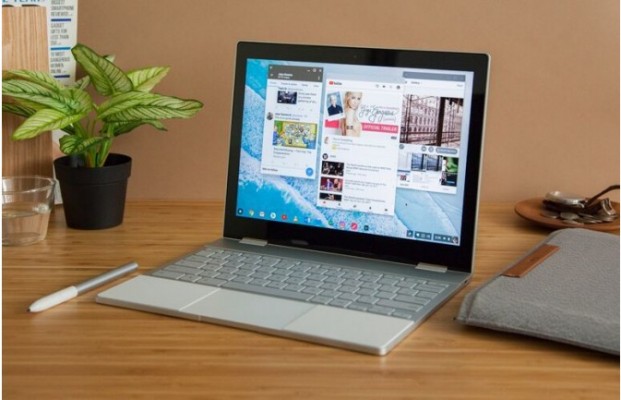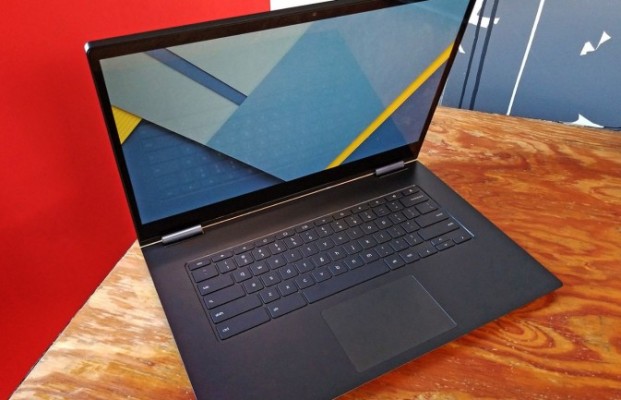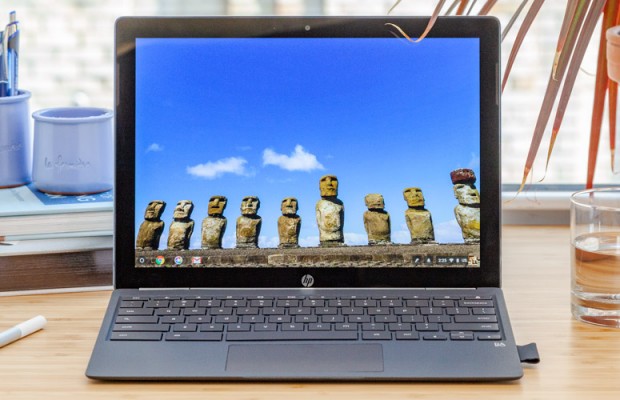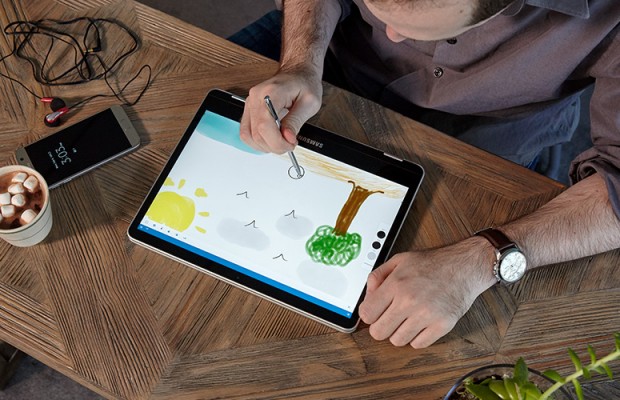Premium Chromebooks Are Here, But Should You Buy?
Sign up to receive The Snapshot, a free special dispatch from Laptop Mag, in your inbox.
You are now subscribed
Your newsletter sign-up was successful
Chromebook critics often complain that they are cheap laptops with poor build quality and small, low-resolution displays — and for good reason. There have been few premium Chromebooks available to those who value the simplicity of Google's operating system. That's largely because Chrome OS has, almost exclusively, been marketed to the education sector, i.e., students and teachers.
That is, until Google released its own Pixelbook, a premium laptop with a starting price of $999, one of the best Chromebooks we've seen. While the laptop was generally well-received, some argue that it doesn't make sense to splurge on premium hardware that can run only web-based programs and Android apps. Traditional laptop manufacturers seemed to have felt the same way, and didn't follow Google's lead. Instead, they continued to sell budget Chromebooks, fortifying Chrome OS' reputation as an operating system meant for children, not adults.
But that's all about to change — the era of the premium Chromebook is here, and consumers should take note.
Welcoming the premium Chromebook
The narrow Chromebook market is finally breaking out of its cheap plastic mold. Over the past few weeks, multiple hardware manufacturers have introduced a handful of Chromebooks made of premium materials, and equipped with high-end components. The stigma applied to Chromebooks — that they're capable of basic tasks and should be used only in a classroom — could soon become a thing of the past.
"I think the fact that these products are moving up into premium is, one, a response to the growing health of the consumer Chrome market, but, two, vendors realizing that they can, and should be, making Chrome a viable part of their strategy moving forward," Linn Huang, a research director at IDC, told Laptop Mag.
According to Huang, an oversaturation of products for the K-12 crowd and the popularity of the new iPad have contributed to a dip in the Chromebook's education market growth rate from 30 percent to single digits. Now, laptop manufacturers are reacting by venturing into higher priced categories.
Sign up to receive The Snapshot, a free special dispatch from Laptop Mag, in your inbox.
These new premium products, which represent a transition from the K-12 to the consumer market, will arrive soon. We got our first look at a series of mainstream Chromebook laptops at IFA 2018 in late August. Lenovo, often praised for its pricey ThinkPad series, will finally release its first premium Chromebook in October, the Yoga Chromebook C630.
"A consumer who hasn't tried one recently may discover that Chromebooks have closed much of the performance gap with MacBooks and Windows notebooks." — Linn Huang, IDC
The 2-in-1 is a direct competitor to the Pixelbook, and comes equipped with an Intel Core i5 CPU, 8GB of RAM and up to 128GB of eMMC storage. For $750, the Yoga Chromebook makes a compelling case when compared with Google's laptop, which has similar components but a much higher starting price. As a convertible laptop, the Yoga Chromebook C630 taps into a popular Windows laptop design, which analysts believe could thrive when paired with Chrome OS.
"I think Chrome has done almost everything it can do in the entry level in terms of form-factor," Baker said. "Clearly there is a lot of interest in the PC form-factor with touch or the 2-in-1, and it's pretty hard to do those under $300, so for Chrome, getting into those segments, which is 25 to 30 percent of the consumer market, is imperative if it's going to keep growing as an ecosystem."
Lenovo isn't the only company pushing Chrome OS into a new market segment. Dell recently took the wraps off its first "premium" Chromebook, the Inspiron Chromebook 14 2-in-1. The 14-inch laptop sports an aluminum design with narrow bezels and a stylus dock, and comes equipped with a Core i3 CPU and 4GB of RAM. Those specs won't set any performance records, but they are a significant step up from Dell's entry-level Chromebooks of the past few years.
MORE: Best Chromebooks Available Now
The Lenovo, Dell and Acer Chromebooks will continue on the path set by devices like the Samsung Chromebook Plus and Pro and the HP Chromebook x2. These mainstream 2-and-1s are some of the more expensive Chromebooks on the market, and, their generally glowing reception has proved that they can go toe-to-toe with comparable Windows machines.
Should you spend more for a Chromebook?
In our Chrome OS and Windows 10 comparison, we state that while Microsoft's OS is more capable overall, Chrome has come a long way to closing the gap, while remaining a speedy, streamlined OS. As such, you don't need as much power under the hood.
However, before criticizing premium Chromebooks for being overkill, it's important to consider the other benefits they bring to the table. The new devices outlined above have sharp displays, durable materials and flexible designs that you won't find on the market today. Now, if you want an (still) inexpensive laptop running Chrome OS, and don't want to compromise on hardware, you don't have to.
"It really isn't about price for me, but form-factor," Baker said. "If you want a more modern form-factor (2-in-1, thinner/lighter, better screen), then I think those features are worthwhile to spend more on. If you are looking for basic computing, most of the low-cost Chromebooks will solve your needs."
Positioned between what we consider the budget and mainstream pricing segments, the new Chromebooks will face direct competition from midrange Windows 10 laptops, like the Acer Aspire E 15. But ultimately, our advice remains the same: If you spend most of your time browsing the web, and prefer Google’s services, get a Chromebook. For everything else, go Windows or Mac.
"If you want a more modern form-factor (2-in-1, thinner/lighter, better screen), then I think those features are worthwhile to spend more on." — Stephen Baker, NPD
Huang agrees. He said that consumers who need the horsepower to play games or run demanding programs are better off with a premium Windows or Mac laptop. Others, especially those who are more familiar with a mobile OS, will appreciate the new devices.
MORE: Laptops with the Longest Battery Life
"A consumer who hasn't tried one recently may discover that Chromebooks have closed much of the performance gap with MacBooks and Windows notebooks," Huang said. "Users who have mostly migrated to the cloud (especially Google's suite of services), have mission critical Android apps, and spend most of their time on their home PC on a Chrome browser will find that new Chromebook offerings more than sufficient."
Predicting the success of premium Chromebooks
The million-dollar question is whether these new, more expensive Chrome OS laptops can find a foothold in a market dominated by Windows 10 and macOS devices. Analysts are bullish about Chromebook's potential to make a dent in the laptop market share.
"The growth in the share of Chromebooks in the entry-level — under $300 — has proven to traditional PC OEMs that there is consumer interest and demand for pure consumer-type products in this market," said Stephen Baker, vice president of industry analysis at NPD. "They're taking share from Windows in the entry-level, but the entry-level as a business isn't growing a lot. Where the growth and opportunity for the OEMs is really in higher-price point products."
IDC forecasts consumer Chrome shipments will reach 3.9 million in 2018, which is a 29.4 percent year-over-year increase; this, at a time when the entire PC market is expected to shrink 3.7 percent.
"We are forecasting pretty aggressive consumer growth rate for Chrome in the U.S. in the holiday season, and this is coming off pretty impressive growth last year," Huang said. "In Q4, the U.S. consumer Chrome [shipments] topped a million units for the first time in a quarter."
IDC forecasts consumer Chromebook shipments will reach 3.9 million in 2018, which is a 29.4 percent year-over-year increase.
Despite the buzz surrounding the emergence of higher-priced Chromebooks, we probably won't see a Dell XPS 13 Chromebook or a Lenovo ThinkPad X1 Chromebook anytime soon. Manufacturers aren't expected to make the leap into the truly premium price category ($1,000+) just yet. The Pixelbook will, therefore, remain an outlier for the foreseeable future.
Google is also rumored to be launching two new premium Chromebooks this fall. Based on the leaks, one Pixelbook 2 will be a laptop with very narrow screen bezels, while the other will be a detachable 2-in-1 device. No word yet on pricing.
"Stuff like the Pixelbook is fun, and it's obviously the type of thing Google can do," Baker said. "I'm not sure the OEMs feel now is the time to be experimenting, I think their dollars are much better placed in that $300 to $700 price range where they can make an impact."
To learn more about the wide world of Chrome OS laptops, check out our Should I Buy a Chromebook? buying guide.
Credit: Laptop Mag
Phillip Tracy is the assistant managing editor at Laptop Mag where he reviews laptops, phones and other gadgets while covering the latest industry news. After graduating with a journalism degree from the University of Texas at Austin, Phillip became a tech reporter at the Daily Dot. There, he wrote reviews for a range of gadgets and covered everything from social media trends to cybersecurity. Prior to that, he wrote for RCR Wireless News covering 5G and IoT. When he's not tinkering with devices, you can find Phillip playing video games, reading, traveling or watching soccer.





